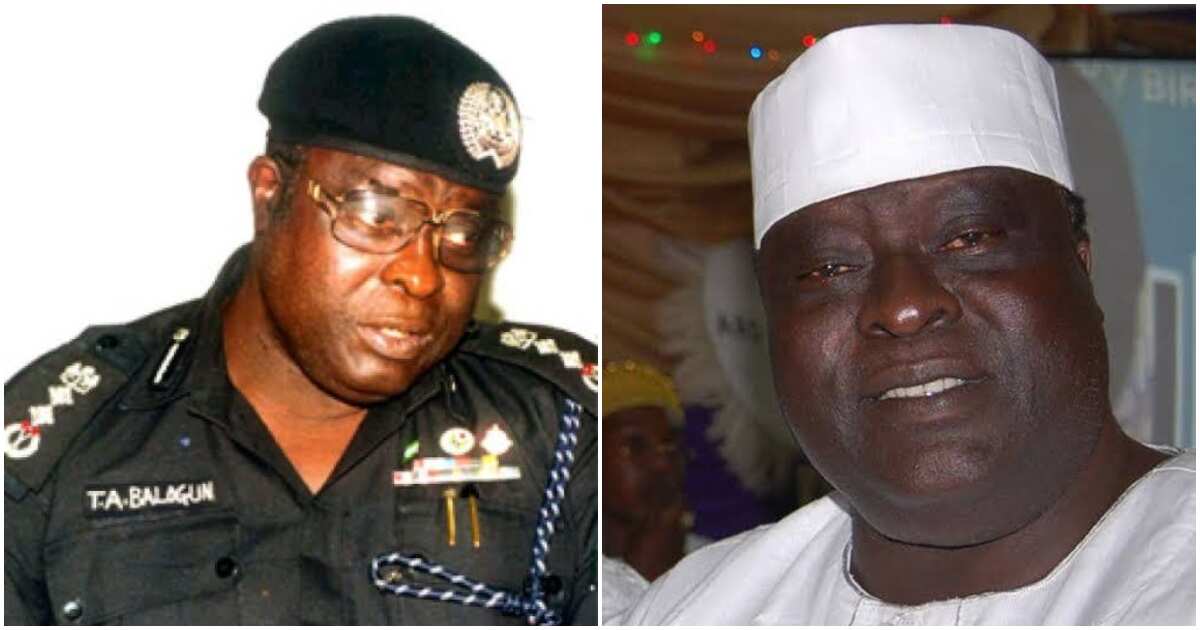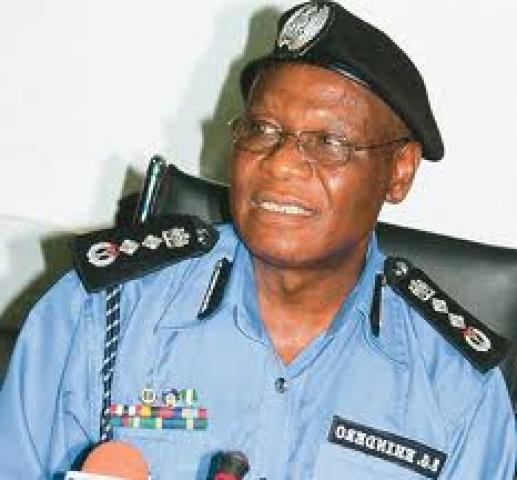Corruption has always been a primary concern for President Muhammadu Buhari’s administration since it was inaugurated in 2015, which repeatedly expressed its readiness to fish our corrupt force officials in the system.
Aspirations to accomplish the 2030 Agenda for Sustainable Development and the aim to move more than 100 million Nigerians out of poverty in the next 10 years have been scuppered by corruption.
ATTENTION: Click “HERE” to join our WhatsApp group and receive News updates directly on your WhatsApp!
We’ll take a look at the biggest corrupt force officials in this post. For Nigeria’s anti-corruption efforts, this piece serves as another evidence of their leadership and shows that they are taking their battle seriously. Although a lot still has to be done to rescue Nigeria from the shackles of Corruption.
Corrupt Force Officials in Nigeria
1. Ibrahim Magu, Former EFCC Chairman

In November 2016, Ibrahim Magu, a Deputy Commissioner of the Nigerian Police, was named Acting Chairman of the Economic and Financial Crimes Commission (EFCC).
The National Assembly, however, rejected the Muhammadu Buhari administration’s attempt to appoint him to lead the EFCC. According to the Senate, a security investigation uncovered that Magu was unfit to serve as the body’s chairman.
While the National Assembly objected, Magu remained to serve as Acting EFCC Chairman despite the opposition he faced.
A second time, in March 2017, the Senate voted to reject Magu’s candidacy, citing claims of human rights abuses by the panel he headed and reports from the Department of State Security (DSS) that Magu failed an integrity exam.
When it came to anti-corruption efforts by the federal government, senators concluded that his appointment would be a liability.
However, after the second rejection, Magu remained the head of the EFCC and was in charge of several high-profile corruption cases that resulted in the conviction and sentencing of numerous politicians and corporate leaders to jail.
A series of corruption charges against Magu culminated in his arrest and suspension as EFCC Chairman in July 2020.
As of June 2020, 22 corruption charges were brought against Magu, including a failure to properly account for N431 million in security votes and data funds provided to the office between 2016 and 2020.
Nigeria’s Attorney General Abubakar Malami said that Magu was guilty of bribery, mishandling of funds, lack of openness in the administration of confiscated assets, and abuse of power. For Magu, the end of his public career was a bitter pill to swallow.
In the midst of all the allegations, Magu was promoted to the post of Assistant Inspector-General of Police by the President Muhammadu Buhari-led government
2. Tafa Balogun, Former Inspector-General of Police

It was during Tafa Balogun’s term as Nigeria’s Inspector General of Police (IGP) from 2002 to 2004 that the country’s criminal activity was significantly reduced with the implementation of Operation Fire For Fire.
Balogun, on the other hand, resigned from his position in 2004 after the Economic and Financial Crimes Commission (EFCC) filed corruption charges against him. Balogun was on trial for eight counts of theft and misappropriation of public funds.
In 2005, he was sentenced to six months in jail by an Abuja high court after pleading guilty to the accusations brought against him. The EFCC had already detained him for 67 days before the verdict.
It was decided that Balogun would be fined N500,000 for each of the eight counts he faced. He was also ordered to relinquish all his assets, including shares and real estate, purchased with funds taken from the police treasury.
They recovered assets worth around $150 million including bank accounts brimming with cash, shares in well-known companies, and 14 high-end residential properties.
During the same year, Nuhu Ribadu announced that the EFCC had succeeded in recouping N17 billion from Tafa Balogun.
3. Fidelis Oyakhilome, Former NDLEA Chairman

Deputy Inspector General of Police, Fidelis Oyakhilome was named Chairman of the National Drug Law Enforcement Agency (NDLEA) in 1988, making him one of Nigeria’s most prominent law enforcement leaders.
He was fired three years later after being suspected of having a connection with a Lagos socialite and businesswoman, Jennifer Madike, who had been convicted for drug-related offenses.
According to Madike, she gathered $80,000 from three guys and planned to present it to Oyakhilome in exchange for the release of two accused drug traffickers.
4. Abba Kyari, former Deputy Commissioner of Police

Abba Kyari, a former Deputy Commissioner of Police and head of the Inspector General’s Intelligence Response Team (IRT), was suspended from the Nigeria Police Force on July 31.
Kyari was suspended while awaiting the conclusion of an investigation into an FBI’s indictment against him.
In a $1.1 million swindle, Ramon Abass, better known on Instagram as Hushpuppi, and Kyari were both implicated as co-conspirators.
Kyari was a well-respected member of the police force before his suspension.
He was a commander of the now-defunct Special Anti-Robbery Squad (SARS) in Lagos State.
It was not the first time a well-known Nigerian police officer had gone downhill.
An anti-drug trafficking organization, NDLEA, originally arrested Mr. Kyari on charges of drug smuggling, for allegedly being involved in trafficking 25 kilograms of cocaine from Brazil to Ethiopia and Nigeria.
As a result of his crime-fighting prowess as head of the Nigerian police intelligence unit, the detective was called “super cop” by the media for a long time.
In the security industry, operatives are often recognized for leading low-key lives. But not Mr. Kyari, who seemed to enjoy the attention he received.
In July of last year, the US Attorney’s Office, Central District of California, obtained an arrest warrant for Mr. Kyari and five others for their participation in a scheme orchestrated by a former Nigerian Instagram sensation, Ramon Abbas, better known as Hushpuppi. After pleading guilty to online fraud and money laundering charges, “Prince of Cash and Flash” Mr. Abbas is now facing up to 20 years in prison.
5. Sunday Ehindero, Former Inspector-General of Police

Former Inspector-General of Police, Sunday Ehindero was put on trial in 2012 for embezzling funds earmarked for the police force.
According to a ruling by the Abuja High Court, Ehindero embezzled N16 million from the police department while serving as the country’s Inspector General of Police.
The judge, Mudashiru Oniyangi, denied Ehindero’s attempt to have the allegations against him thrown out.
The International Criminal Court (ICPC) alleged that Mr. Ehindero and a Commissioner of Police in charge of the budget at the Force Headquarters, John Obaniyi, conspired to swindle the sum.
Mr. Obaniyi was suspended while Mr. Ehindero retired from the police force.
The Bayelsa State Government gave N567 million to the Nigeria Police during the term of Mr. Ehindero as police chief for the acquisition of weapons, ammunition, and riot control equipment.
The money was put into a bank and earned N16 million in interest.
According to ICPC, Mr. Ehindero and Mr. Obaniyi were responsible for the loss of the money.
However, Ehindero was subsequently exonerated. The allegations against him were found to be false. Nobody knows if he was cleared because of additional corruption that occurred in the shadows or if he was not guilty.
Conclusion
We hope that this article on Nigeria’s biggest corrupt force officials will help the government and the people of the country to better understand the progress that has been made in the fight against corruption as well as the methodology for assessing the effect of this effort.
It can also help uncover possible flaws in the anti-corruption program and recalibrate, refocus and readjust where necessary.
As Nigeria’s anti-corruption campaign continues to grow, we hope that this piece will help it become even more successful and beneficial to the population.
READ ALSO: 7 Nigerian Governors Who Were Sent to Jail After Office
